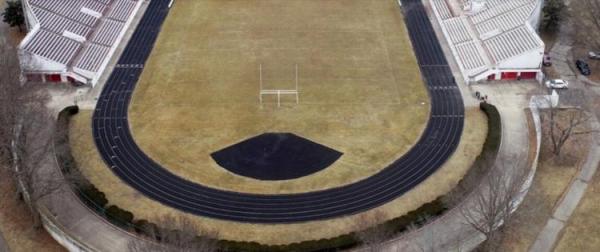August 9, 2024

White Stadium in Franklin Park. City of Boston image
In the newest development in an ongoing battle over the renovation of an athletic stadium in Franklin Park, local advocates sent a letter to over a dozen state and city officials alleging the City of Boston's plan isn't legally compliant -- a claim that the city denies.
Boston and Boston Unity Soccer Partners LLC, a for-profit company, hope to renovate White Stadium in Franklin Park and make it the home for a National Women's Soccer League team and provide a state-of-the-art facility for Boston Public School students to use as their home turf. Boston Mayor Michelle Wu says the stadium would still be available for community use 90 percent of the time, and that BPS, which currently operates the stadium and uses it for athletic fields, cannot afford to renovate it on their own.
The Garrison Trotter Neighborhood Association and Emerald Necklace Conservancy, which has been leading the effort against what they describe as the "privatization" of White Stadium, sent the letter to Energy and Environmental Affairs Secretary Rebecca Tepper, Secretary of State William Galvin, Secretary of Transportation Monica Tibbits-Nutt, MBTA Board Chair Thomas Glynn, Department of Conservation and Recreation Commissioner Brian Arrigo, and CC'd a number of local and state officials including Wu and Gov. Maura Healey.
They claim that the redevelopment and construction of a new complex within Franklin Park has "failed to comply with numerous legal obligations requiring permits, approvals, licenses and/or leases," including reviews from the Massachusetts Environmental Policy Act Office (MEPA) and Massachusetts Historical Commission (MHC).
The city, however, says the plan has been extensively vetted, and that this project is not subject to certain reviews following a preliminary court ruling made in March about the controversial stadium build.
The Emerald Necklace Conservancy and local advocates from Jamaica Plain, Roxbury, Dorchester and Mattapan sued this spring to immediately stop progress on the project, saying the city and company violated Article 97 of the Massachusetts Constitution in their pursuit of the renovation.
Article 97, or the Public Lands Preservation Act (PLPA), which voters approved in 1972, empowers the Legislature to order the purchase or acquisition of land for conservation, recreation or open space purposes, and it sets a requirement that releasing any property from those protections must be done with a two-thirds vote of the Legislature.
Suffolk County Superior Court Judge Sarah Ellis denied the motion to stop the demolition and construction, based partially on a decision that White Stadium is not subject to Article 97, said a source from the Boston mayor's office.
The stadium has been managed by BPS through the George Robert White Fund since it was completed in 1949. The state passed a law in 1950 that established that the stadium was a school property, not parkland, the source said.
Many of the legal processes outlined in the letter are moot following the court's declaration that the stadium is not subject to the public lands preservation law, the mayor's office source said.
Louis Elisa, one of the letter's signatories and president of the Garrison Trotter Neighborhood Association, said that even if White Stadium is not on Article 97 land, the renovation will have impacts beyond the current footprint of the facility.
"Some of the issues there in the letter are rehashing the injunction," Elisa said. "But they are utilizing parts of Franklin Park that do not come up under the purview of the Robert White Fund, and so the letter is asking them to look at the total process. Even though the judge may claim that in this particular spot, the nexus of this spot, may not be subject to Article 97, the overall process is, because of the impact of this project on the park itself."
Among other things, the letter takes issue with the transportation impacts of 11,000 soccer fans getting to the stadium for games or live entertainment.
There will be no parking lot, and the city says it has a transportation plan, including having shuttles bring people to and from the closest MBTA stops and remote lots, and preparing increased Uber and Lyfts in the area. Certain streets in the area would be closed off for resident parking only.
"Article 97 is an important question, that we feel legally still applies based on case law. But I would say outside of Article 97, based on transportation numbers and a variety of other factors, MEPA environmental protections still apply," said Emerald Necklace Conservancy President Karen Mauney-Brodek.
She continues, "It is very problematic to hear that there's an idea that a stadium with 11,000 fans and massive changes to the park would not require state environmental review."
Elisa said he is asking state officials to "do their due diligence to see what the possible impact might be to the communities who depend on this park."
The city says that the stadium design and impact has undergone extensive local review, securing approval from the Boston Landmarks Commission, Boston Civic and Design Commission, Suffolk Design Commission, and other bodies.
As the final adjudication of the Emerald Necklace Conservancy's lawsuit waits for its day in court — scheduled for March 2025 — the city is continuing to advance the project, the mayor's office source said.
As of Thursday afternoon, Elisa said he had not received a response from any of the state or city officials who received the letter on Wednesday.


